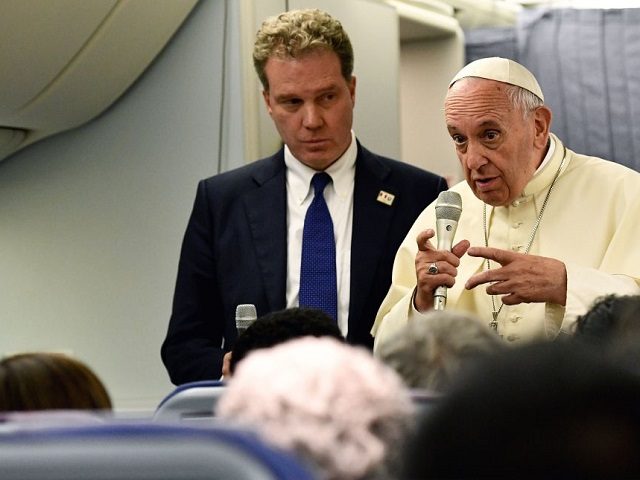There is a big difference between corruption and sin, Pope Francis contends, because the sinner can always convert but the corrupt person sees no need for conversion.
During his in-flight press conference returning from Peru to Rome Monday, the pope reflected on the evil of corruption, when a person’s conscience no longer registers right and wrong.
Noting that corruption can be found everywhere, from Europe to Latin America, Francis said he believes that “the root of corruption is original sin, which each person bears in himself.”
“I wrote a booklet one time, a very small one, called Sin and Corruption and the theme was sinners yes, corrupt no,” he said.
“All of us are sinners,” he said. I am not afraid of sin, I am afraid of corruption, because corruption perverts both body and soul.”
“And a corrupt person is so sure of himself that he cannot go back,” the pope added. “They are like those swamps that you try to get out of and they suck you back in. It’s a swamp. Yes, it’s the destruction of the human person.”
Francis observed that while there is plenty of corruption in politics, there is also corruption in business and even in the home.
“The businessmen who underpays his workers is corrupt. And a housewife who thinks that it is normal to exploit the maids either by underpayment or by the way she treats them, is corrupt as well,” he said.
“And is there corruption in the Church? Yes, there are instances of corruption in the Church,” he said. “This has always been so. Men and women of the Church have engaged in the game of corruption.”
This isn’t the first time Pope Francis has highlighted the distinction between sin and corruption, insisting that the latter is more dangerous.
In the fall of 2014, the pope offered similar reflections to a delegation from the International Association of Penal Law, in which he said that the widespread problem of corruption is “a greater evil than sin.”
Corruption is like “bad breath,” the pope said, “it is hard for the one who has it to realize it; others realize it and have to tell him.”
According to Francis, remorse and conversion are only possible when one is aware of evil, which is not the case with a corrupt person.
“The corrupt person does not perceive his corruption,” the Pope said. “For this reason, it is difficult for the corrupt person to get out of his state through remorse of conscience. More than forgiven, this evil must be cured,” he said.
“Few things are harder than opening a breach in a corrupt heart,” Francis continued. “When the personal situation of the corrupt becomes complicated, he knows all the loopholes to escape as did the dishonest steward of the Gospel.”
“The corrupt person goes through life taking the shortcuts of opportunism,” said the Pope, “with an air of innocence, wearing the mask of an honest person, which he begins to believe.” The corrupt person “cannot accept criticism, discredits anyone who criticizes him, tries to belittle any moral authority who would question him, does not value others and insults anyone who thinks differently. If the balance of power permits, he persecutes anyone who contradicts him.”
Unfortunately, Francis said, the problem is widespread.
“Corruption has become natural, a personal and social custom, a common practice in commercial and financial transactions, in public procurement, in any negotiation involving State agents,” he said.
The panorama is not pretty, and there are no quick fixes.
“Still,” says Francis, “the Lord never tires of knocking on the doors of the corrupt. Corruption is powerless against hope.”
Follow Thomas D. Williams on Twitter Follow @tdwilliamsrome

COMMENTS
Please let us know if you're having issues with commenting.